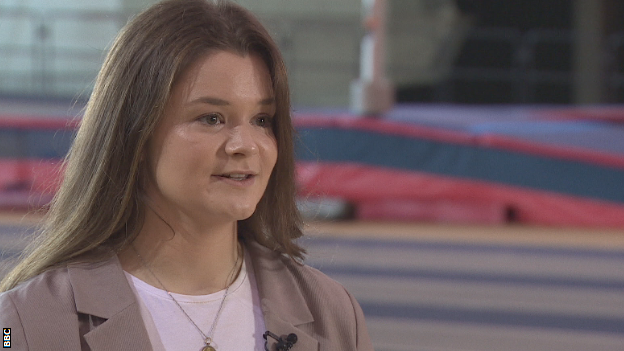Athletics: Anna Gordon says abuse procedures must change
- Published

Anna Gordon says a 'clear message' must be sent for those who make claims of abuse
Procedures must change to provide better support to athletes who make claims of abuse within sport, says pole vaulter Anna Gordon.
In 2013, she made allegations of sexual abuse against a coach; after a nine-month trial he was found not guilty.
Gordon says after making the claims, she was shunned and insulted by fellow athletes and their parents.
"People I used to say, 'Hi' to at the track, they wouldn't look at me," Gordon told BBC Scotland.
"Getting to competitions, I would be told that I didn't deserve to compete. Parent helpers would come over in the middle of training sessions and say things like, 'We know what you've done'. Usually I'd wake up to horrible messages, names I didn't know."
The Scottish junior record-holder in her event, Gordon says she was blocked on social media by an athlete she "looked up to more than anyone", and was subsequently hospitalised.
"[Being blocked] took some of the hope that things would get better out of it. After that, things got much more difficult to manage," she added.
"After the incident where the athlete blocked me, I was admitted to hospital with neurological problems brought on by extreme stress."
Gordon, 22, is now back competing, but says her experiences after making the claim left a mark. She has produced a video detailing her experiences and is appealing for greater support for those who need it.
In a statement, Scottish Athletics chief executive Mark Munro, said: "It is absolutely vital that the message to everyone in the sport is very clear. Athletics is a fantastic sport, abuse will not be tolerated and we will seek to support anyone who raises an issue or makes a disclosure of abuse.
"There are over 150 affiliated clubs, all of whom have in place policies and procedures for dealing with referrals. The club welfare officer should be the first person to speak to, but we recognise that in some cases you may want to speak to someone outside the club and a referral can be made directly to us, or to the police who will take the appropriate action."
'A bridge is missing'
Gordon believes procedures for when an allegation is made have "improved massively", but she says: "There's a bridge that's missing and nobody's really acknowledging it or addressing it. And it's between when something happens and someone being able to say something."
The athlete from Perth says fear plays a big factor in preventing some from making allegations. Fear of upsetting the athletics family, not being selected for teams and being blamed if other athletes lose out on their coach if allegations arise.
"The happy families community, the reliance on coaches and the selection procedures, they all factor into that," she said.
"I think there's a huge misconception about how teams are actually picked. It used to be the case that if you were number one in the country you would get picked for a team and you would go to the competition, which is ultimately how your career progresses. It went from that to an A standard and B standard, so an A standard is that you have to hit a target, a B standard is subject to discussion although there's still a target involved, but we're moving more and more towards subjectivity and I think that's a huge problem.
"I think we need to move in the opposite direction. We need to move away from a group of people sitting around a table discussing who they think should be on a team, so it means people won't be scared to say anything, you don't feel as though you have to keep in with people."
And on others losing their coach amid abuse allegations, she says: "In UK athletics, when a coach is the subject of abuse allegations, their coaching licence is immediately revoked. A great idea would be to bring in replacement coaching so that people aren't negatively affected.
"It would also take a lot of blame off the person who has said something."
Gordon says she is comfortable using her experiences to help those who may need it, and is hoping Scottish Athletics will take some of her ideas regarding changes in protocol on board.
She said: "It's obviously not the easiest decision to do something like this, you never really want to be that person, but I think to be honest it's so much more important that we put these new things in place to move forward."